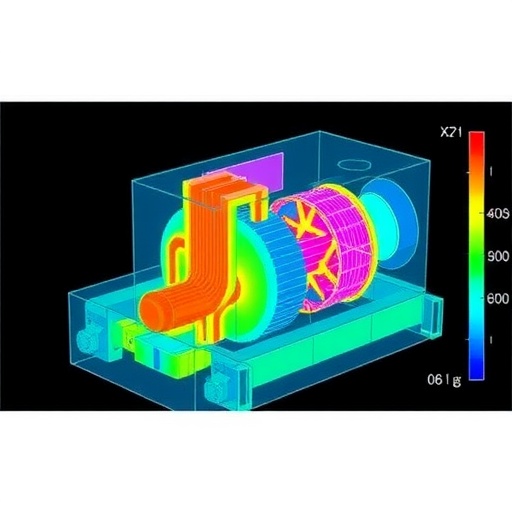In the rapidly evolving field of energy technologies, fuel cells have emerged as a vital component in the quest for sustainable and efficient power sources. Among the different types of fuel cells, high-power fuel cell stacks are particularly important for applications that require significant energy output. A recent study by Zhang, Xiao, and Su, published in the journal Ionics, delves into the intricate dynamics of gas flow distribution within these high-power fuel cells. This comprehensive research reveals critical insights into how gas flow characteristics evolve and affect the overall performance of fuel cells, paving the way for advancements in fuel cell technology.
The study presents a composite model that simulates the behavior of gas flow in a fuel cell stack, which is essential for understanding the electrochemical reactions taking place. The authors highlight that efficiency in power generation is highly dependent on uniform gas distribution across the fuel cell electrodes. Uneven distribution can lead to inefficient operation, reduced lifespan, and increased operational costs. By employing a sophisticated computational methodology, the researchers unveil the factors that contribute to optimal gas flow and how these factors can be manipulated to enhance fuel cell performance.
One of the significant advancements in this study includes the introduction of variables that account for changes in temperature and pressure within the fuel cell stack. Through their simulations, the researchers were able to track how these variables impact the flow distribution, providing a more nuanced understanding of the fuel cell’s operational environment. This innovative approach not only contributes to theoretical knowledge but also offers practical strategies for the design and improvement of fuel cells.
A notable aspect of the study is the emphasis on the importance of a tailored approach to gas flow management. The researchers suggest that adopting a personalized model for each fuel cell application is crucial for achieving maximum efficiency. Their findings indicate that a one-size-fits-all strategy is insufficient, and that engineers should consider specific operational conditions when designing fuel cell systems. This insight is particularly valuable as the demand for tailored energy solutions continues to grow in various industries.
Furthermore, the study explores the relationship between gas flow dynamics and the longevity of fuel cells. The researchers found that improved flow characteristics lead to a more stable operational environment, thereby extending the life of the fuel cell system. This discovery highlights the importance of addressing gas flow at the design stage, suggesting that optimization not only improves immediate performance but also contributes to the sustainability of the technology over time.
In addition to practical applications, the research presents a theoretical framework that can be utilized in future studies. By establishing a foundation of knowledge regarding gas dynamics in fuel cells, Zhang and colleagues enable other researchers to expand upon their work. This collaborative approach is vital in the scientific community, as the quest for efficient energy solutions benefits from shared insights and innovation.
The implications of this study extend beyond academic interest; they resonate within various sectors, including automotive, aerospace, and stationary power generation. As industries increasingly turn to fuel cells for cleaner energy alternatives, understanding the intricacies of gas flow distribution becomes paramount. This research equips engineers and stakeholders with the tools necessary to create more effective fuel cell systems, ultimately contributing to a greener future.
Moreover, the study’s findings help illuminate potential avenues for further exploration. For instance, researchers may investigate how different fuels and operating conditions can be utilized in conjunction with the optimized gas flow patterns identified in this study. The potential to enhance fuel cell efficiency through innovative fuel choices presents an exciting opportunity for future advancements.
As the world confronts the pressing challenges of climate change and environmental sustainability, research initiatives like this underscore the importance of continued investment in fuel cell technologies. The results from this study have the potential to influence policy decisions and funding priorities, directing resources toward the development of high-power fuel cells as viable energy solutions.
In conclusion, the study conducted by Zhang, Xiao, and Su presents a significant contribution to the understanding of gas flow distribution characteristics in high-power fuel cell stacks. By elucidating the evolution laws governing gas dynamics, this research not only enhances theoretical knowledge but also provides practical insights that can lead to improved fuel cell design and efficiency. As industries move toward cleaner energy solutions, the findings from this study will undoubtedly play a crucial role in shaping the future landscape of fuel cell technology.
This research exemplifies how science can address real-world problems and fuel innovation. By prioritizing effective gas flow management, researchers and engineers can collaboratively push the boundaries of what is possible with fuel cell technology, forging a path toward sustainable energy solutions for generations to come.
The world is eager for breakthroughs in energy technologies, and the findings from Zhang et al. serve as a reminder that the road to clean energy is paved with rigorous scientific inquiry and commitment. As these studies continue to evolve, they bring us one step closer to realizing the full potential of high-power fuel cells as a cornerstone of sustainable energy.
Subject of Research: Understanding gas flow distribution characteristics in high-power fuel cell stacks
Article Title: Study on gas flow distribution characteristics and evolution law of high power fuel cell stack based on composite model
Article References:
Zhang, G., Xiao, L., Su, J. et al. Study on gas flow distribution characteristics and evolution law of high power fuel cell stack based on composite model.
Ionics (2025). https://doi.org/10.1007/s11581-025-06730-2
Image Credits: AI Generated
DOI: https://doi.org/10.1007/s11581-025-06730-2
Keywords: fuel cells, gas flow distribution, energy efficiency, sustainable technology, high-power stacks.




